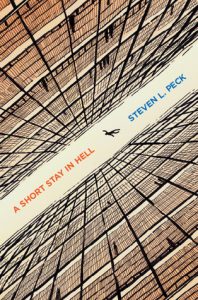 Title: A Short Stay in Hell
Title: A Short Stay in Hell
Authors: Steven L. Peck
Publisher: Strange Violin Editions
Genre: Speculative
Year Published: 2012
Reviewed by Chad Curtis
I first encountered Stephen Peck on an LDS Perspectives podcast entitled A Religion of Both Prayers and Pterodactyls. The interview conducted by Laura Harris Hales dealt with the intersection of science and religion and how Peck, a scientist himself, reconciles the two. I added several of his books to my reading list, including A Short Stay in Hell.
The book has a fascinating premise: you die, and you find out whatever system of belief you followed was wrong. In fact, the “one truth” turned out to be Zoroastrianism. A demon (employed by God; hell requires a good manager after all to achieve its purposes. As the book states, “[Satan] has rebelled against God, but in charge of Hell? Heavens no. How can you think God would let something like Hell exist if He’s really in charge of the universe? Sheesh.”) assigns you a personal hell for educative purposes. The book follows a Mormon protagonist in his assigned hell: the library of Babel. You must search shelves upon shelves of books stretching to near-infinite proportions until you find the one describing your life. Then you can move on to whatever comes afterwards.
The premise itself immediately brings to mind the well-known scene in Southpark:
Wait a minute, I shouldn’t be here. I was a totally strict and devout Protestant. I thought we went to heaven.
Yes, well I am afraid you were wrong.
I was a practicing Jehovah’s Witness.
Well, you were wrong religion as well.
Well who was right? Who gets into heaven?
I’m afraid it was the Mormons. Yes, the Mormons was the correct answer.
I would probably go so far as to describe this book as a work of Mormon existentialism. It deals with a lot of hard topics, such as what do you do when you find out all your beliefs were myth? How do you maintain meaning in life in a seemingly monotonous and meaningless world? Particularly poignant are the moments when the protagonist starts wrestling with the idea that his whole belief system on earth is moot. He tries drinking a cup of coffee, and eventually begins pondering:
All my life I had lived with a strong sense of morality. How do you give it up? How do you do things you thought you’d never do? Where do all the things you believed go, when all the supporting structure is found to be a myth? How do you know how or on what to take a moral stand, how do you behave when it turns out there are no cosmic rules, no categorical imperatives?
Perhaps a little more philosophical approach than the Southpark one. Peck based his book off a short story by Jorge Luis Borges, taking the idea of the endless library of books filled with gibberish. I wasn’t familiar with the short story, but it reminded me of C. S. Lewis’s conception of hell in The Great Divorce as a constantly expanding town, as individuals move farther and farther away from each other because they can’t stand being in close proximity to one another. One of the “rules” in hell is that you can still be injured and die, but you come back to life the next day to continue your search for your book. This results in some rather painful consequences, as characters either use or abuse this feature. It brought to mind the vocabulary and social etiquette of a favorite childhood video game, Runescape, e.g. gamers engaging in “pking” or player killing.
The book is a great read, and will definitely get you thinking.
